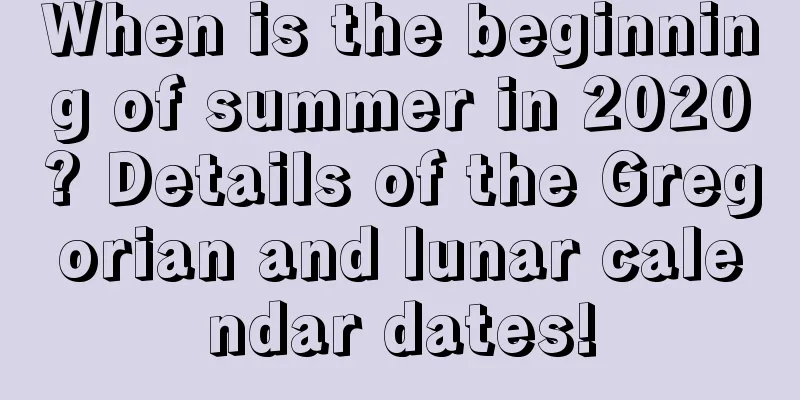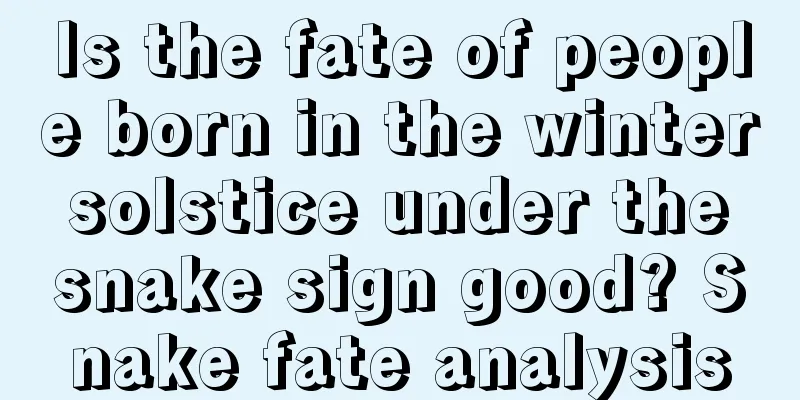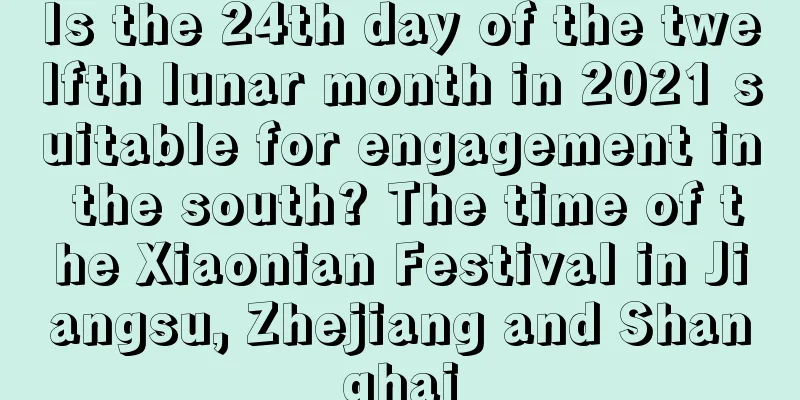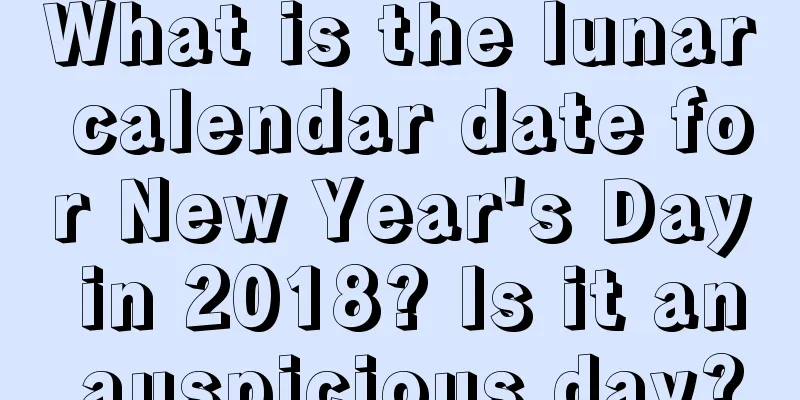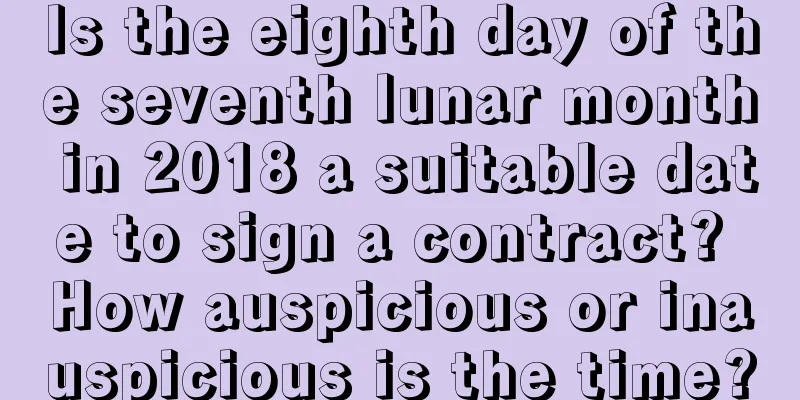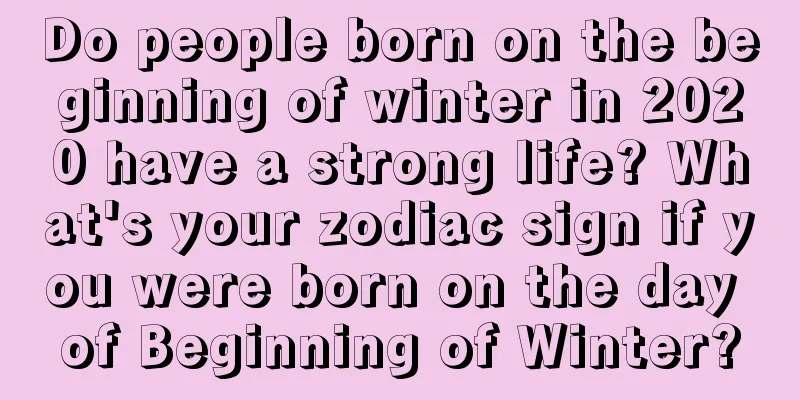What are the traditional customs of the Winter Solstice on the fifth day of the eleventh lunar month in 2017? What is the origin of the winter solstice?
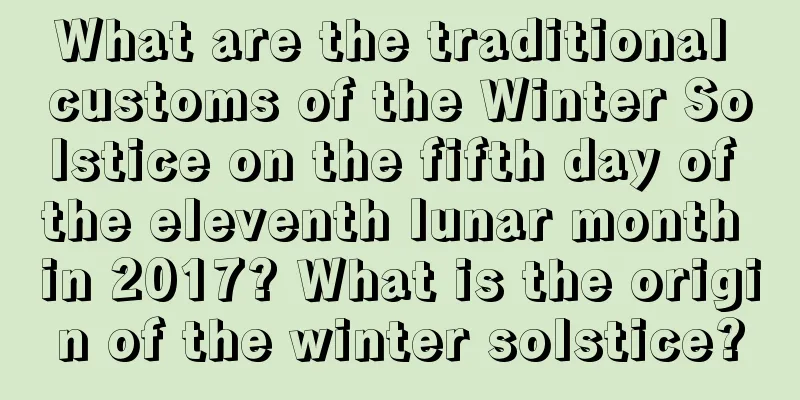
Under the influence of China's long-term culture, the Winter Solstice, as a traditional festival in our country, has gradually evolved into various customs. So what are the traditional customs of the Winter Solstice? Let’s find out together. In the eleventh month of the lunar calendar, whether it is weddings or family affairs, everything is happy. The Fortune Teller website brings you the blessings of the winter month to bring you auspicious warmth. I wish you all the best!What are the traditional customs of the Winter Solstice on the fifth day of the eleventh lunar month in 2017?1. The Winter Solstice Festival is also known as the Winter Festival and the Winter Exchange Festival. It is one of the 24 solar terms and a traditional Chinese festival. There was once a saying that "Winter Solstice is as important as New Year's Day". The court and the people have always attached great importance to it, and sacrificial activities have been held since the Zhou Dynasty.2. Eat dumplings. On the winter solstice of the lunar calendar every year, dumplings are an indispensable holiday meal for everyone, regardless of their wealth. As the saying goes, "On October 1st, the winter solstice arrives, and every household eats dumplings." This custom is left behind to commemorate the "medical saint" Zhang Zhongjing who gave out medicine on the winter solstice. Eating dumplings on the Winter Solstice is a way to remember the kindness of the "Medical Saint" Zhang Zhongjing's "Quhan Jiao'er Soup". There is still a folk song in Nanyang today that goes, "If you don't eat dumplings during the winter solstice, your ears will freeze off and no one will care." 3. After the ninth day of the ninth month, some scholars and literati would organize so-called cold-eliminating activities. They would choose a ninth day and meet up with nine people to drink (“wine” and “nine” are homophones of each other), with nine dishes and nine bowls on the table. A “nine-piece” mat would be used to represent the cold-eliminating period. Song for the Nine-Nine Days to Get Rid of the Cold: Don’t go out on the first and second nine days; walk on the ice on the third and fourth nine days; from the fifth to the sixth nine days, watch the willows along the river; on the seventh nine days, the river ice melts and on the eighth nine days, swallows come; on the ninth nine days plus the tenth nine days, oxen can be seen everywhere. What is the origin of the winter solstice?The Winter Solstice Festival originated in the Han Dynasty, flourished in the Tang and Song dynasties, and has been passed down to this day. "Qing Jia Lu" even says that "Winter Solstice is as important as New Year's Day." This shows that the ancients attached great importance to the winter solstice. People believe that the winter solstice is the natural transformation of yin and yang, and is a blessing bestowed by God. In the Han Dynasty, the winter solstice was regarded as the "Winter Festival". The government held a celebration ceremony called "Hedong" and a routine holiday. The Book of the Later Han Dynasty recorded: "Around the winter solstice, gentlemen rest themselves and rest, officials stop working and do not attend to government affairs, and choose auspicious days to do things." So on this day, the court would take a day off, the army would be on standby, the border fortresses would be closed, businesses would stop operating, and relatives and friends would give each other delicious food and visit each other, happily spending a holiday of "resting themselves and resting."During the Tang and Song dynasties, the Winter Solstice was the day to offer sacrifices to heaven and ancestors. The emperor would go to the suburbs to hold a grand ceremony to offer sacrifices to heaven, and the people would worship their parents and elders on this day. Even now, some places still celebrate the Winter Solstice. The Winter Solstice is a very important solar term in the Chinese lunar calendar. As early as the Spring and Autumn Period more than 2,500 years ago, my country had used a gnomon to observe the sun and determine the arrival of the winter solstice. It was the earliest of the 24 solar terms. The winter solstice is an astronomical solar term that occurs between December 21 and 23 of the Gregorian calendar each year. It is the day with the shortest daylight and longest night in the northern hemisphere throughout the year. It was called "the shortest day" or "the shortest day" in ancient times. It is also a traditional festival of the Han nationality in my country, and there are still many places that have the custom of celebrating the Winter Solstice Festival. The winter solstice is commonly known as the "Winter Festival", "Longest Day Festival", "Second Year", etc. |
<<: What is the nickname for the 2017 Winter Solstice? What is the winter solstice also called?
>>: Is it good for a baby Rooster born on November 19, 2017 in the lunar calendar?
Recommend
What zodiac sign is August 19th in the lunar calendar 2021? Is the fortune today good?
The eighth month of the lunar calendar belongs to ...
2020 June 5th Lucky and Unlucky Query, Query of Preferential and Unfavorable Hours
June is also known as the hottest month of the ye...
The lunar calendar for February 14, 2018, is it a good day?
If you want to know more about the second month o...
What is the date of the second day of the tenth lunar month in 2019?
What is the date of the second day of the tenth l...
Is May 14th of the lunar calendar in 2021 a good day to travel? Is it suitable for travel?
In the fifth month of the lunar calendar, most par...
What are the tips for things to do in December? Which month in the lunar calendar is the twelfth lunar month?
What are the tips for things to do in December? Wh...
Is today, April 24th to June 15th in the 2020 lunar calendar, a good day in the lunar calendar?
Introduction: In our country’s traditional customs...
Is September 19th of the lunar calendar 2017 a good day? Is it possible to bury the deceased?
Introduction: Burial is to allow the deceased to b...
When is the Chushu solar term in 2021? What are the do's and don'ts?
Every solar term is spiritual. It is like our best...
Is it a good idea to move to a new house during the 2018 Spring Festival? Are there any taboos or precautions?
The Spring Festival is a festive time with many cu...
Will we welcome the God of Wealth on the eighth day of the first lunar month in 2021? Where is the auspicious position of the God of Wealth?
The God of Wealth is one of the auspicious gods in...
Can we swim during the Dragon Boat Festival in 2018? Are there any taboos during the Dragon Boat Festival?
Introduction: The Dragon Boat Festival is an impor...
How is the life fortune of a baby girl born on May 21st? How is her luck?
May is the time when pomegranate flowers are in fu...
Five Feng Shui Evils You Must Stay Away From in Feng Shui
Introduction: Everything has a relative side, and...
The 14th day of the 10th lunar month in 2018 is a good day?
It is the tenth month of the lunar calendar in 20...
